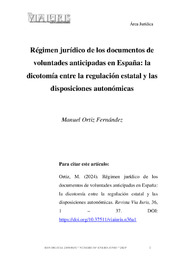Please use this identifier to cite or link to this item:
https://hdl.handle.net/11000/34072Full metadata record
| DC Field | Value | Language |
|---|---|---|
| dc.contributor.author | Ortiz Fernández, Manuel | - |
| dc.contributor.other | Departamentos de la UMH::Ciencia Jurídica | es_ES |
| dc.date.accessioned | 2024-12-09T11:44:20Z | - |
| dc.date.available | 2024-12-09T11:44:20Z | - |
| dc.date.created | 2024-01 | - |
| dc.identifier.citation | Revista Via Iuris, 36 (2024) | es_ES |
| dc.identifier.issn | 2500-803X | - |
| dc.identifier.uri | https://hdl.handle.net/11000/34072 | - |
| dc.description.abstract | La elaboración de los documentos de voluntades anticipadas (también denominadas instrucciones previas), supone un ejercicio del consentimiento informado que, sin embargo, despliega sus efectos en un momento posterior. En cuanto al régimen jurídico aplicable en España, dada la particular división del territorio en comunidades autónomas y la distribución de competencias, es necesario atender tanto la Ley 41/2002 del 14 de noviembre, como las diferentes normativas sectoriales. A este respecto, la parquedad de la Ley 41/2002, unida a la disparidad de criterios incluidos en las disposiciones autonómicas, generan muchas dudas interpretativas. El objetivo principal del presente estudio es analizar el panorama legislativo español, aportando posibles soluciones en este campo. En tal sentido, consideramos que es imprescindible que el legislador estatal establezca unos mínimos comunes para todo el territorio y defina los contornos de esta institución. Entre otras, por cuanto se refiere a los sujetos legitimados, las vías para su otorgamiento y las limitaciones legales aplicables, se empleará el método hipotético - deductivo. | es_ES |
| dc.description.abstract | The preparation of advance directive documents (also called prior instructions) involves an exercise of informed consent that, however, unfolds its effects at a later time. Regarding the legal regime applicable in Spain, given the particular division of the territory into autonomous communities and the distribution of powers, it is necessary to comply with both Law 41/2002 of November 14 and the different sectoral regulations. In this regard, the parsimony of Law 41/2002, together with the disparity of criteria included in the regional provisions, generates many interpretative doubts. The main objective of this study is to analyze the Spanish legislative landscape, providing possible solutions in this field. In this sense, the state legislator must establish standard minimums for the entire territory and define the contours of this institution. Among others, as regards the legitimate subjects, the means for granting it and the applicable legal limitations, we will use the hypothetic-deductive method. | es_ES |
| dc.format | application/pdf | es_ES |
| dc.format.extent | 37 | es_ES |
| dc.language.iso | spa | es_ES |
| dc.publisher | Fundación Universitaria | es_ES |
| dc.rights | info:eu-repo/semantics/openAccess | es_ES |
| dc.rights | Attribution-NonCommercial-NoDerivatives 4.0 Internacional | * |
| dc.rights.uri | http://creativecommons.org/licenses/by-nc-nd/4.0/ | * |
| dc.subject | Declaración anticipada | es_ES |
| dc.subject | autonomía de la voluntad | es_ES |
| dc.subject | decisión | es_ES |
| dc.subject | consentimiento | es_ES |
| dc.subject | España | es_ES |
| dc.subject.other | CDU::3 - Ciencias sociales::34 - Derecho | es_ES |
| dc.title | Régimen jurídico de los documentos de voluntades anticipadas en España: la dicotomía entre la regulación estatal y las disposiciones autonómicas | es_ES |
| dc.type | info:eu-repo/semantics/article | es_ES |
| dc.relation.publisherversion | https://doi.org/10.37511/viaiuris.n36a1 | es_ES |

View/Open:
ArtViaiuris (1).pdf
249,98 kB
Adobe PDF
Share:
.png)
